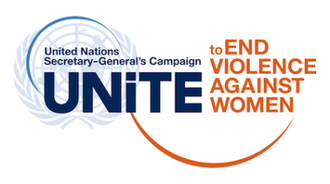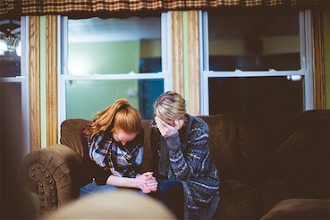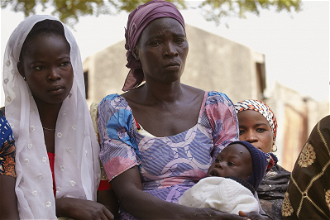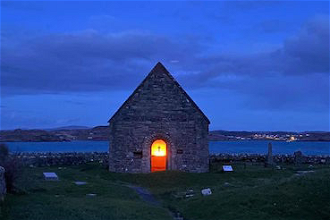Let's mobilise to end violence against women

Friday 25 November 2022 marks the International Day for Ending Violence Against Women and Girls (VAWG) which starts 16 days of global activism. This year's theme is 'Unite! Activism to End VAWG'.
The National Board of Catholic Women and Caritas Social Action write:
Here in the UK, VAWG continues to be the most pervasive violation of human rights. The cost-of-living crisis is exacerbating the problem as poverty traps increasing numbers of women and girls in situations where they are exploited, oppressed and abused.
Migrant women with no recourse to public funds are not protected by the Domestic Abuse Act 2021 and are therefore particularly vulnerable.
VAWG is a global issue: over the last few weeks in Iran, several young women have been attacked or killed while protesting against laws which forbid them to remove their hijab in public, and there are reports of systematic rape used as a weapon of war in Ukraine. The UN has reported a global increase in VAWG since the pandemic, with 45% of women disclosing that they or someone they know has been subjected to violence. There is also an increased backlash against global initiatives to end VAWG, including several countries backing out of the Istanbul Convention. Around the world, a woman or girl is killed by a partner or family member every 11 minutes.
We know that women with a religious faith can face additional barriers when trying to escape abuse in the home. The "Keeping the Faith Report" highlighted the fact that survivors with a religious faith found that their needs were not met by statutory services, who did not understand their faith needs, or by their faith communities who did not understand the abuse they were suffering. They may also be subjected to spiritual abuse; the perpetrator manipulating and exploiting the victim's faith in order to control them. sometimes with a twisted and weaponised version of scripture.
The dignity of all people is at the heart of Catholic Social Teaching, and Pope Francis calls us to unite to end violence against women and girls. He has said that "to hurt a woman is an insult to God" He has also spoken of the importance of supporting women who have been subjected to violence and ill treatment.
Leela Ramdeen, Consultant, Former Chair, Trinidad & Tobago Catholic Commission for Social Justice & Archdiocese's Ministry for Migrants and Refugees writes:
Pope Francis has warned against the "culture of indifference", and has called on us to follow God's example of love, "without ever turning away" in tending to people's needs. He has spoken out against domestic violence on several occasions. As New York Times reported, in February 2021, the Holy Father released a video calling attention to the issue, and its many manifestations: "psychological violence, verbal violence, physical violence, sexual violence," he said. These abuses are "acts of cowardice and a degradation of all humanity" ( See: www.nytimes.com/2021/12/20/world/europe/pope-domestic-violence-almost-satanic.html .)
It's time to step up our mobilisation efforts to end violence against women in the world. We cannot be indifferent in the face of the onslaught of violence against women. It dehumanises all of us. It plagues all strata of every society; all religious and ethnic groups. As Shalu Nigam, an Indian lawyer who uses her expertise to address issues related to the rights of women, says: "Violence against women implies not only an assault of the body, mind, or soul, but it also occurs when the conditions are being enabled to facilitate it and when the system - the state and the society, excuses it."
The UK Observer's Editorial (Sun 20 November) is worth reading: "The Independent Office for Police Conduct published its investigation into a truly awful case of police failure to intervene in a case of domestic abuse. They found that West Midlands police "materially contributed" to the murders of Raneem Oudeh and her mother, Khaola Saleem, in 2018, through their repeated failures to address the threat that Oudeh's violent former partner posed to their lives...some forces don't regard domestic abuse as a serious crime...Reducing the number of women who die each year at the hands of men is eminently achievable. But it requires the police and the criminal justice system to prioritise male violence against women in the same way they do other forms of male violence, including terrorism. Otherwise, women will continue to die as those responsible for keeping them safe look the other way."
The Center for Women's Global Leadership, which first launched the 16 Days of Activism Against Gender-Based Violence in 1991, along with the participants of its Global Institute, acknowledges that "all the years spent fighting to raise awareness about gender-based violence has not brought about lasting, fundamental change. It has not brought about the radical systemic and cultural shifts we hoped it would, and it has not made gender-based violence against women a universally unacceptable act...There has been a shift in consciousness ... but there has not been an adequate shift in practice to end violence against women."
The 2017 UNDP-UN Report, Commitment to Action: Public Policies to Eradicate violence against women in Latin America and the Caribbean, highlighted the fact that in spite of some progress, the region has the highest rate of violence against women. The Report recommended that e.g., social pacts should be generated among governments, the private sector and civil society to engage all relevant actors in ending this scourge.
In June 2019, the ILO committee "adopted a legally binding convention supplemented by a recommendation. The convention includes clear guidance for governments, employers, and trade unions to identify and eliminate discriminatory behaviours and address the discriminatory outcomes of unequal power relations that lie at the heart of gender-based violence" (CWGL).
Legislation alone will not defeat this evil. We need a multi-sectoral approach with coordinated interventions if we are to change hearts and minds. Let's address the root causes; socialise our boys/men to respect themselves and girls/women; empower girls/women, amplify their voices; play our part in building a culture of life, love and mutual respect from an early age - starting in the home; build strong and inclusive social movements; redouble our efforts to promote the inherent dignity of each woman and to protect their lives; offer solidarity and support at all levels to the victims of violence e.g., providing comprehensive services/safety nets - in education, health, the justice system, social welfare - including providing appropriate shelters for victims of violence; ensure that interventions draw on the media/social media as they can/should play a more prominent role in the struggle. We are our neighbour's keeper.
Since ending violence, including violence against women is everyone's business, let's raise our awareness of the issues and commit to changing the violent culture that permeates our lives by promoting positive values, beliefs, attitudes, behaviours and practices.
Let's continue our efforts all year round - 365 days of activism - to advance the human rights of women.
LINKS:
UN Women Action Guide: www.unwomen.org/en/what-we-do/ending-violence-against-women/take-action/16-days-of-activism
Women's Aid: www.womensaid.org.uk
Welsh Women's Aid: www.welshwomensaid.org.uk
Safe in Faith (Caritas Westminster): www.safeinfaith.org.uk
National Domestic Abuse helpline 0808 2000 247 website: www.nationaldahelpline.org.uk
Live Fear Free Helpline (Wales) 0808 80 10 800 https://welshwomensaid.org.uk/en/what-we-do/live-fear-free-helpline/
Galop: https://galop.org.uk 0800 999 5428
Rape Crisis: https://rapecrisis.org.uk/get-help/want-to-talk/ Tel: 0808 802 9999


















